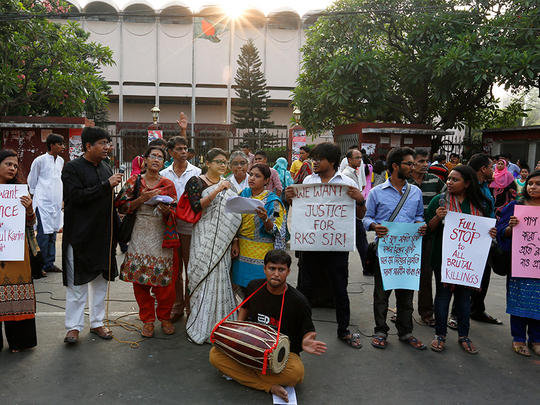
Abu Dhabi: Bangladeshi expatriates in the UAE have expressed grave concern at the recent killings in the country, saying that the attacks make the nation appear intolerant to differing and minority ideologies.
Condemning the heinous crimes, they also called upon lawmakers to hold the killers accountable for their actions.
“The impunity with which these crimes are occurring is actually scary, and it means that many expatriates are afraid to go back home to visit family. In the long run, it also means that talented Bengali youth and intellectuals who study or work abroad look for ways to remain outside the country. For a developing nation, such brain drain truly impedes progress,” Mohammad Anwarul Azim, 60, a senior accounting executive, told Gulf News.
The Asian nation has been seeing a spate of fatal assaults on activists, liberals and minorities since last year, with two rights activists and a professor being killed in the last week alone. Another online activist was also murdered earlier this month for his anti-Islamist views.
In 2015, four secular bloggers and a publisher were hacked to death, in addition to fatal attacks on religious minority groups, including Christians, Hindus, Sufis, Ahmadis and Shiites.
No one has yet been convicted for these deaths, but Daesh, as well as a Bangladesh branch of Al Qaida, have both claimed responsibility. The Bangladeshi government, on the other hand, says home-grown Islamists should be blamed.
Rather than hold a group responsible however, Azim said that each killer should be arrested and punished.
“A crime is a crime and unless the perpetrators are caught, the resulting air of lawlessness will also strip revenues from tourism and remittances,” the father-of-three added.
Kazi Imamul Haque, 59, another father-of-three and supervisor at an automobiles distributor, said all people deserve protection regardless of their opinions or beliefs.
“As a conscientious Bangladeshi, I do not support any form of loss of life. The criminals should be brought to justice as soon as possible so that the country does not seem unstable and uninviting, and I would urge the government to ensure that this is done,” Haque said.
The expatriates added that the events have also created a negative idea about the country’s love for hospitality and its civil society.
“It is most important for people’s mindsets to change. We need to promote healthy activism and tolerance in a civil society. Otherwise, the country’s ranking on security indexes will also suffer,” said Akhtarul Hoque, 59, a planning engineer.
He added that such murders and attacks had also affected the way that people perceive Bangladeshis.
“For our part as expatriates, we can only model positive behaviours, and attempt to dispel the worries and concerns people have about Bangladesh.”
Mohammad Tofail Alam, 47, a senior operator at an on oil and gas company, added expatriates and non-resident Bangladeshis also suffered from instability within the Muslim-majority nation.
“Foreign demand for Bangladeshi manpower tends to fall, and it looks as if Bangladesh does not support activism and people’s freedoms. For us, it is saddening to note the negative perception this creates of our beloved homeland. This is why the government must come forward and ensure stability and security for all,” he explained.








